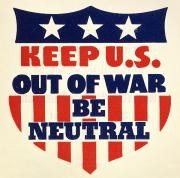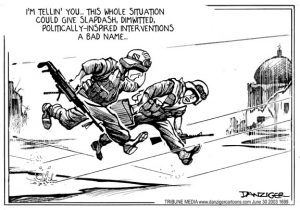By Jim Babka, Downsize DC
I considered myself a non-interventionist for many years. Now I advocate regime change! It’s not the kind favored by military interventionists. I’m not adopting that label or approach. Instead…

Call me an engager!
An engager seeks regime change through various forms of cultural engagement, including…
- Diplomacy
- Trade
- Bi-lateral travel (including both emigration and immigration)
Cultural engagement is the superior method of regime change because…
Our culture is a liberating solvent that can kill or transform despotic systems.
The Soviet Union is the greatest example because it was one of the most daunting enemies the United States ever faced. 
Soviet authorities permitted showings of The Grapes of Wrath because they thought it depicted capitalism in a bad light. But Soviet audiences focused on the fact that the Joad family could flee their failing farm in their own car, whereas Soviet workers lacked automobiles and the freedom to move! The Soviets had to withdraw the film to prevent further “subversion.”
Leslie Woodhead argued persuasively that the advent of the Beatles was the beginning of the end for the Soviet Union. Interviews with many Soviet leaders, including Gorbachev, bolster his case. Other historians have documented how various cultural items from blue jeans to the soap opera Dallas helped undermine the Soviet system.
But our culture’s liberating solvent has likewise impacted other despotic regimes. Consider Iran. Millions of satellite dishes point skyward, absorbing western culture. And Ayatollah Khamenei understands that our culture weakens his power. It’s one of the reasons he keeps calling the United States the Great Satan.
Diplomacy plays a role too. The policy of détente (reducing tensions), combined with increased cultural engagement, led directly to glasnost (transparency), perestroika (restructuring), and the end of the Soviet Union. The related diplomatic opening to China led to visiting ping-pong teams, followed by ever-growing cultural interaction. The result has been a freer and wealthier China.
The military interventionists claim they can achieve the same results by using violence to impose democracy on foreign lands. They claim this will foster peace and security because democracies don’t attack each other. But a simple question defeats this claim…
What democracies?
Robust democracies created primarily by U.S. military force are hard to find. My colleague, Perry Willis, has demonstrated that all U.S. wars…
- Created more enemies than they eliminated
- Retarded freedom
- Increased insecurity
- Made the world worse
Recent military actions in the Middle East provide a classic example. We were promised “cheering in the streets” and reformed Islamic cultures. What we got instead were streets filled with remote-controlled explosive devices and festering Islamic radicalism. This radicalism has infected western ally Turkey so that it’s becoming less democratic right before our eyes!
The military interventionists are simply blind to what causes real regime change.
Cato’s Daniel Griswold piles study upon study to demonstrate that…
- Trade leads to wealth
- The “freer” that trade is, the larger the resulting middle class becomes
- This new middle class “samples” outside culture, wants more, and then builds democracy by demanding the freedom to acquire more
In other words, it’s not military violence that creates democracy or freedom. Cultural engagement is the real source of positive regime change. Griswold observes that…
- In 1973, 35% of the world was “free” and 47% was “unfree.”
- By 2007, 46% was “free” and 36% was “unfree.”
And what large trend overlaps this period? International trade exploded.
How cultural engagement causes positive regime change
Tyranny thrives in the dark. Exposure to other cultures unravels the fears and habits totalitarians require.
- Trade and travel increase wealth
- Increased wealth pushes tyrannized populations up the hierarchy of needs
- A little freedom leavens a desire for more
These cultural factors are “weapons” for regime change.
Trade also fosters peace. Producers don’t kill their customers. Consumers don’t attack their providers. Trade is profitable. Conflict is costly. Our dollars and Euros and Yen act as junior diplomats!
Some of my best friends are non-interventionists
We non-interventionists are not ambivalent to the horrors of tyranny abroad, so we shouldn’t permit accusations of callous isolationism to stick. Besides, only we libertarians have a working method to overthrow statist, hell-hole tyranny. To preserve and expand peace, we need to win the battle of ideas. 
And we should triumph. History is on our side. It has been amply demonstrated that war, trade barriers, and immigration controls are the enemies of positive regime change. Yet the foreign policy establishment and our rulers never seem to learn. They double down on their past, failed policies.
Let us speak loudly for regime change plans that use the tools of cultural engagement. Perhaps then we could routinely triumph over these war-mongering interventionists.
Jim Babka is the President of DownsizeDC.org, Inc. where you can tell your so-called “representatives” in Congress that you want a policy of cultural engagement.



2 Trackbacks
[…] https://downsizedc.org/non-interventionism-not-sufficient/ […]
[…] Why Non-Interventionism is NOT sufficient – DownsizeDC https://downsizedc.org/non-interventionism-not-sufficient […]